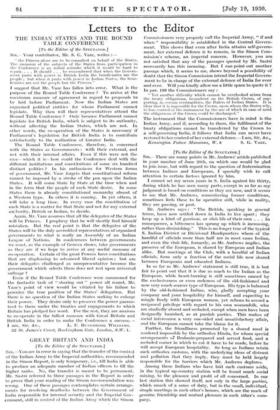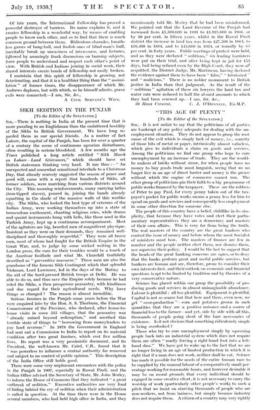[To the Editor of the SPECTATOR.]
Sne,—There are many points in Mr. Andrews' article published
in your number of June 28th, on which one would be glad
to join issue, but with regard to the question of fraternization between Indians and Europeans, I specially wish to call I cannot set my seven years in S. India against his thirty,
in the form that the people of each State desire. In some during which he has seen many parts, except in so far as my States there is already constitutional monarchy almost of judgment is based on conditions as they are now, and it seems a Western type. In others it is coming. In yet others, it to me that Mr. Andrews, remembering former conditions, take a long time. In every case the constitution of
will sometimes feels these to be operative still, while in reality, each State is a matter for that State and not for any external they are passing, or past.
authority, British or Indian, to decide. Mr. Andrews says : " The British, speaking in general Again, Mr. Vaze assumes that all the delegates of the States terms, have now settled down in India to live apart ; they k
will be Princes. I prophesy that he will shortly find himself keep up a kind of garrison, or club life of their own . . . In consequence, a bitterness has sprung up which is increasing, mistaken. But the real point is that the delegates of the rather than diminishing." This is no longer true of the typical States will be the duly accredited representatives of organized European, while heart-burning is still sometimes caused by Even if the Round Table Conference were summoned for Further, the friendliness promoted by a shared meal is rendered impossible by the orthodox Hindu, for whom special
arrangements or Brahmin-prepared and served food, and a secluded corner in which to eat it have to be made, before he
Of late years, the International Fellowship has proved a powerful destroyer of barriers. Its name explains it, and it creates fellowship in a wonderful way, by means of enabling people to know each other, and so to find that there is much common ground between them. Ridiculous charades, breath- less games of bang-ball, and foolish ones of blind man's buff, inevitably break up uneasiness of intercourse, and lectures, fttllowed by amazingly frank discussions on burning subjects, force people to understand and respect each other's point of view. With British and Indians joining in social work, their shared interests create bonds of fellowship not easily broken.
I maintain that this spirit of fellowship is growing, not deteriorating, and that it is a healthier thing than the " assimi- lation " of former times, the disappearance of which Mr. Andrews deplores, but with which, as he himself admits, grave evils were connected.—I am, Sir, &e., A CIVIL SERVANT'S Wien.

















































 Previous page
Previous page